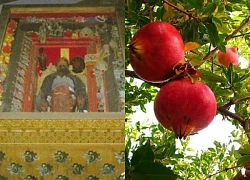The old man passed away and left the house to his eldest daughter-in-law. His two sons were left empty-handed and discovered something shocking.

2 | 0 Discuss | Share
In ancient times, every evening a man would beat a gong and shout: "The weather is dry, be careful of firewood." Why do the people need him and what will happen without these people?
When watching Chinese historical dramas, it is not difficult to see the image of a man often walking around at night with the catchphrase "The weather is dry, be careful of the firewood" (or "The weather is dry, the fire is dry.") firewood room").
They were called watchmen, or watchmen, which was a very important profession in ancient times. The farmer appeared as early as the Qin Dynasty, but it was not until the Han Dynasty that it became an official and popular profession among the people.
The appearance of the above character is also understandable because in ancient and medieval times there were no clocks. To grasp the time of day, people will have to look up at the sky, based on the height of the Sun to estimate. But this method at night is almost useless. For that reason, a profession called "farming" was born.
Usually, the watchmen are a group of two people, working in the middle of the night. Two people working together can both increase work efficiency and support each other. In it, one person holds a lamp to light the way, one person holds a gong or bamboo pipe, two people chant while walking.
The act of a watchman using a stick to hit a gong or bamboo tube to create a sound is called hitting the watch. Because they were hired by the local government, the farmer was also a "public employee" as they call it today. The requirement to do this job is to have good health, the younger you are the more priority you have.
According to historical records, the watchman would knock 5 times every night, each time 2 hours apart. After the sun goes down the mountain, the watchmen start working. At 7:00 p.m. is the first watch, and at the same time a reminder about theft and fire prevention.
In modern times, 7pm is meal time, far from bedtime. But in ancient times, at this time it was already dark, people finished eating and climbed into bed to sleep. The first sound of the watchmen hitting the bamboo gong at 7pm is also the sound that reminds everyone to quickly finish unfinished work and prepare to sleep peacefully. For people at that time, fire was not something to play with.
At the sound of the first bamboo knocker of the night, it reminds everyone that before going to bed, they must extinguish all candle flames, turn off the stove, and prevent fires. Houses in the past were almost all built of wood and straw, which are very flammable. Once the fire gets out of control, the consequences will be unpredictable.
After a tiring day of work, people often tend to climb into bed immediately with a full stomach. Therefore, reminding people to extinguish all firewood before going to bed is extremely important.
The gong rings at 9pm, which is also the time when people should sleep peacefully. But every time, there are people who try to stay up all night. The mother takes care of her children, the wife mends clothes and sews clothes... Paying attention to the flickering candlelight, time passes without realizing it.
When they heard the second watch, they were startled and stopped what they were doing and prepared to go to bed. Most ancient people did not have the habit of sleeping in bed but got up very early. Therefore, going to bed early and ensuring sleep quality every day is important and should not be neglected.
The third gong sounded at 11:00 pm. The night is deserted, which is also the ideal time for thieves to commit their crimes. Hearing this echo, the thieves were more or less scared and more cautious.
Guards roaming the alleys and alleys are also seen as performing patrol duties. The thieves mostly tried to hide so as not to be caught by the guards because they were also "employees" of the government.
The fourth gong is played at 1:00 a.m., which is also the time when the temperature is lowest. At that time, the watchman will shout: "At the hour of the Ox, the sky and earth are cold." Remind everyone to pay attention to the temperature, check whether the doors are closed tightly or not to avoid harmful cold winds from entering.
It is known that the hour of the Ox is the time from 1am to 3am. At this time, the farmer's work was almost completed. When the fifth gong rings, the sky begins to gradually brighten. The watchman shouted: "Dan time is on the fifth watch, go to bed early and get up early, take care of your health." This is also the "alarm sound" for people to wake up and get out of bed to start a new day.
The origin of the "cultivator" profession began before China was unified by Qin Shi Huang, that is, from the Spring and Autumn - Warring States period. At that time, people did not call them "farmers" but called them "millet people".
The reason why they are called "millet man" is because this person's characteristic is to signal like a chicken signals us the time in the morning. "Killer" refers to the similar image of a person who does this profession at night.
In the book Zhou Li (a book recording the rituals of the Zhou Dynasty), the role of characters like this is also mentioned: "The ke man holds his gong, and in major ceremonies of the court, he will shout loudly to convey the message. let the officials know to perform the ritual."
On weekdays, the "miller" is still responsible for signaling people at night to be careful of theft and prevent fires. Later, such people changed their names to be called "canh phu". They are considered an employee of the government.
It was not by chance that he was chosen to be a "farmer". Because the chosen person is sometimes elected, usually someone with good health, a loud voice and trust. Because this is hard work, you have to stay up almost all night.
The pomegranate tree grows on Qin Shi Huang's tomb and the terrible mystery behind!  Hoàng Phúc20:35:39 06/04/2025Although the tomb of Emperor Qin Shi Huang has been discovered for decades, archaeologists insist that it is impossible to enter inside. One of the most well-known is that there is still a large amount of mercury inside.
Hoàng Phúc20:35:39 06/04/2025Although the tomb of Emperor Qin Shi Huang has been discovered for decades, archaeologists insist that it is impossible to enter inside. One of the most well-known is that there is still a large amount of mercury inside.

2 | 0 Discuss | Share

2 | 0 Discuss | Share

5 | 1 Discuss | Share

3 | 0 Discuss | Share

2 | 1 Discuss | Share

1 | 0 Discuss | Share

1 | 0 Discuss | Share

5 | 1 Discuss | Share

3 | 0 Discuss | Share

3 | 0 Discuss | Share

2 | 0 Discuss | Share

4 | 0 Discuss | Share










3 | 1 Discuss | Report